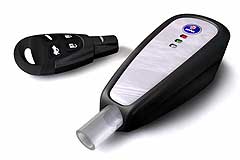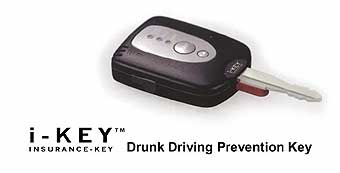Around the world, drunk driving is responsible for more traffic fatalities than any other single factor. Last year. 40-percent of all traffic fatalities in the U.S. involved alcohol-impaired drivers. In Europe, 25-percent of drivers killed in accidents can be attributed to drunk driving.

Increasing concern about drunk-driving in Sweden and elsewhere prompted Saab to develop a solution, the Alcokey. Saab’s President and CEO, Peter Augustsson, notes “As a car manufacturer, Saab is keen to do what it can to help prevent such behavior. ….the Alcokey concept is a very practical and efficient solution. It will help those who want to be sure they should only get behind the wheel when they are fit to drive.”
The Alcokey, an adaptation of existing anti-theft technology, uses a small mouthpiece in the key fob. The breath sample passes through a small internal tube containing a tiny semi-conductor sensor. A transponder communicates the alcohol level determined by the sensor to the car’s electronic control unit, whose software has been appropriately modified. The car will not start if the breath sample contains alcohol above legal levels.
After the sample has been analyzed and a small green or red light on the fob lights up. A green light means the alcohol level is less than the limit and the key will transmit an “all clear” signal to the car’s electronic control unit so the engine can be started. However, if a red light glows, the “all clear” signal will not be sent and the engine will continue to be immobilized. The alcohol sensor is activated when the driver presses the “unlock doors” button on the remote-control key fob. The software can be adjusted according to the legal limits for the locale in which the vehicle is registered.
The prototype Alcokey is a separate unit that works with the Saab remote keyless control fob. In the future, miniaturization could result in a single, pocket-sized unit. According to Saab, the Alcokey would cost about $300 in volume production, a fraction of the cost of a current fixed interlock systems that require major vehicle modifications done by a qualified technician.

On the other side of the world, Tiger International Japan Ltd. as developed the i-KEY that works much like the Alcokey; however, it does not depend on the vehicle's electronics. Thus, its potential application is more universal. This technology integrates a breath analyzer into virtually any key fob so it can be used regardless of the age and model of the vehicle.
The key has a protruding interlock bar that blocks entry into the ignition. It retracts once a breath sample been analyzed and is under the legal limit. The iKey uses a combination of sensors, electronics, computer, telematics, RF, and micro-motor technologies. The driver blows into a small mouthpiece on the side of the i-KEY to get the "green light" to start the engine. If the alcohol level exceeds the legal limit, a red light will show and the interlock bar will prevent the key from entering the ignition key slot.
The i-KEY, has already been tested extensively on a wide range of vehicles. Champion In-car Telematics, a division of Champion Technology Holdings Ltd. has formed a global alliance to market and manufacture the system under two labels - i-KEY and d-key for markets in China, Japan, Korea, Asia, Europe, North America, South America, New Zealand and Australia. Japan will be the first market to officially launch the i-KEY, expected to be around the fourth quarter of 2004.
Interlocks like Alcokey and i-KEY could become mandatory and thus installed as standard equipment. However, mandatory use could result in legal challenges in some countries, especially the U.S. Of course, these interlock devices could be defeated, for example, by having a sober person breathe into the device. But so can the more expensive, permanent interlock systems.




